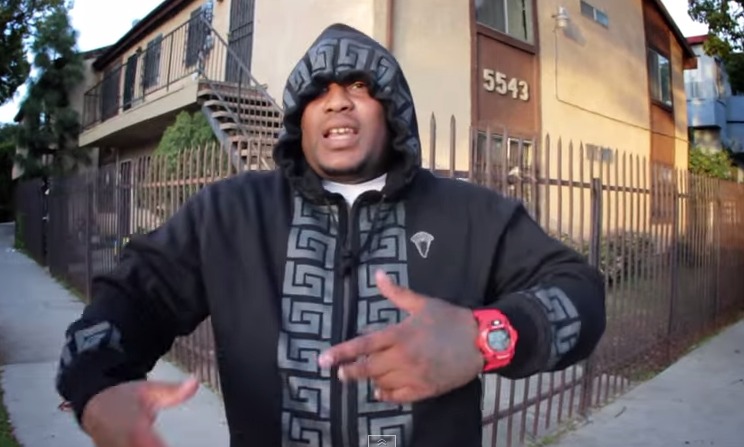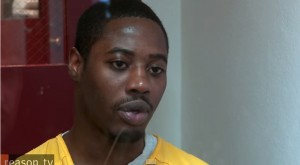As we wrap up National Poetry Month, here's a thought: Can what you write actually land you in prison? It sure can — especially if it takes the form of rap lyrics.

Academics Charis Kubrin and Erik Nielson are watching the prosecution of rappers very closely, and they document dozens of court cases where rap lyrics were introduced as key evidence in criminal trials. In the 2014 journal article "Rap On Trial," they write that "prosecutors have become adept at convincing judges and juries alike that the lyrics are either autobiographical confessions of illegal behavior or evidence of a defendant's knowledge, motive or identity with respect to the alleged crime."
Some of the most notable cases, as reported in outlets like the Daily Beast and Huffington Post in recent weeks:
- Brandon Duncan — also known as Tiny Doo — was charged under a California law intended to crack down on street gangs. Prosecutors claimed that Duncan was a member of a gang that was connected to several shootings, and that Duncan's lyrics — which talked about various criminal activities — showed that he was directly benefiting from the gang's crimes. No one has been arrested in connection with the actual shootings, but Duncan was being tried for having written songs that prosecutors claimed were linked to those crimes. Thankfully a San Diego Superior Court judge dismissed the charges.
-
 A California rapper named Laz Tha Boy — Deandre Mitchell — spent almost 2 years in jail after being indicted on charges linking him to two shootings. His attorneys argued that there was no evidence connecting him to the crimes — except for his rap videos, which "were presented to the grand jury as evidence of his criminal behavior." The videos were made before the shootings in question.
A California rapper named Laz Tha Boy — Deandre Mitchell — spent almost 2 years in jail after being indicted on charges linking him to two shootings. His attorneys argued that there was no evidence connecting him to the crimes — except for his rap videos, which "were presented to the grand jury as evidence of his criminal behavior." The videos were made before the shootings in question.
- When Louisiana rapper Torrance Hatch — who goes by Lil Boosie — was charged in 2012 with murder, prosecutors used his often violent lyrics to argue that they reflected his role in the crime. A jury disagreed.
- Rapper McKinley "Mac" Phipps was charged in 2000 with first-degree murder after a shooting at one of his concerts. As in other cases, Phipps' lyrics were what prosecutors turned to, claiming that songs like "Murda, Murda, Kill, Kill" demonstrated his mindset. As the assistant district attorney put it, "You don't have to be a genius to figure out that one plus one equals two." At his trial, according to an extensive Huffington Post investigation last month, lyrics from different songs were stitched together, and in one instance were altered to make them sound more menacing. He is currently serving a 30-year sentence.
- In 2007, Illinois college student Olutosin Oduwole was arrested on charges of making a terrorist threat and sentenced to five years in prison. The "threat" came in the form of a note he had written and left in his own car; Oduwole said it was a draft of a rap lyric. In 2013 his conviction was overturned on appeal.
- One of the most well-known cases involves Vonte Skinner, a New Jersey rapper who was convicted of shooting a drug dealer in 2005. Prosecutors read jurors the lyrics to many of Skinner's songs, some of which were written years before the crime was committed. Last year the state's Supreme Court decided, in a 6-0 vote, to overturn his attempted murder conviction, declaring that the "violent, profane, and disturbing rap lyrics authored by defendant constitute highly prejudicial evidence against him that bore little or no probative value as to any motive or intent behind the attempted murder offense with which he was charged."
There are many other examples, all based on the dubious notion that a person's art can be used as evidence in a crime — even if there is no direct link to the crime in question. A 2004 training manual for prosecutors recommended that "even music lyrics" could "exploit the defendant's true identity." In 2006 the FBI offered similar advice, suggesting a link between lyrics and a suspect's "true-life experiences."
As University of Richmond professor Erik Nielson put it, "in many cases, prosecutors are fully aware they are putting fiction on trial, and on some level misrepresenting it to secure a conviction." And Nielson and rapper Killer Mike argued in a column for USA Today this misunderstands hip-hop's relationship to violence: "The kids spending hours per day writing rap songs aren't a threat to society; they are often trying to escape the threats from society."
And they argue that this approach is exclusive to rap music: "No other fictional form — musical, literary or cinematic — is used this way in the courts, a concerning double standard that research suggests is rooted, at least in part, in stereotypes about the people of color primarily associated with rap music."
Indeed, it would be absurd to bring charges against Francis Ford Coppola linking scenes in The Godfather to a particular Mafia crime spree, or to arrest a video game maker on the theory that violent acts in a particular game reveal the game maker's real-life crimes.
But this is what prosecutors are doing when it comes to rap music. It is an outrageous attack on free expression.

